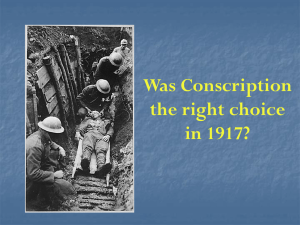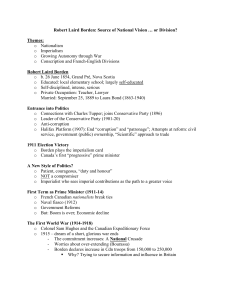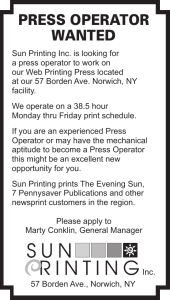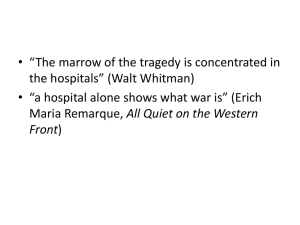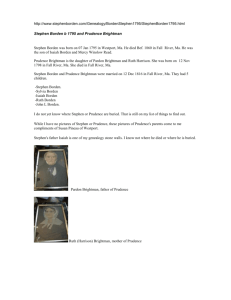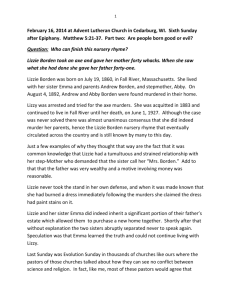A Sudden Illness -- How My Life Changed
advertisement
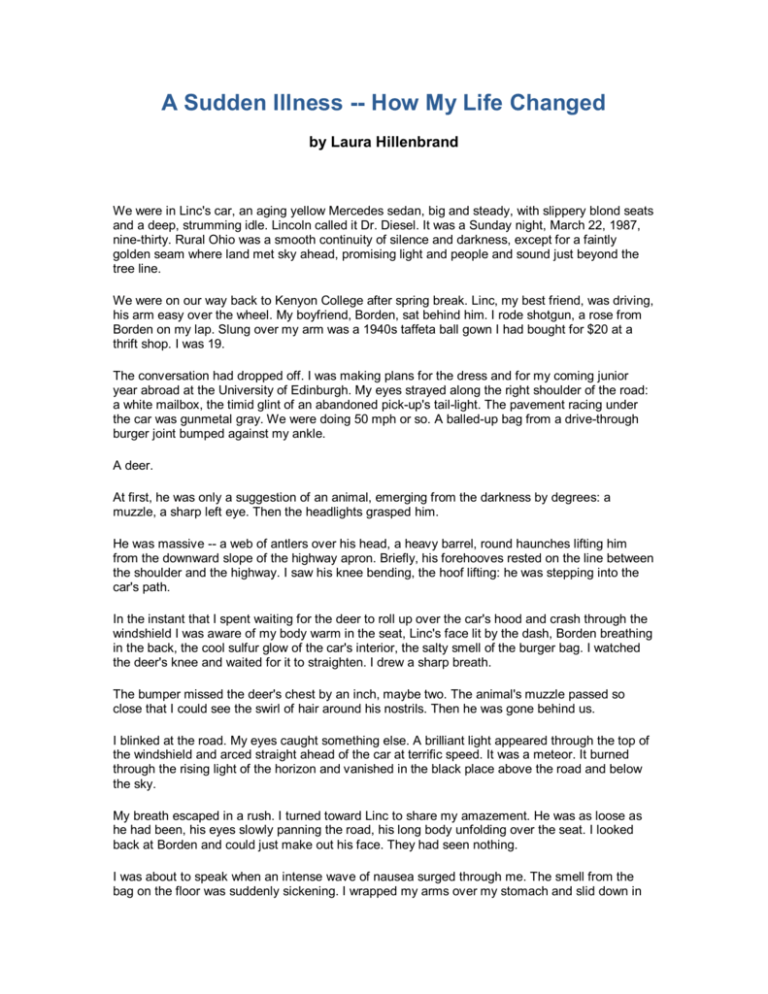
A Sudden Illness -- How My Life Changed by Laura Hillenbrand We were in Linc's car, an aging yellow Mercedes sedan, big and steady, with slippery blond seats and a deep, strumming idle. Lincoln called it Dr. Diesel. It was a Sunday night, March 22, 1987, nine-thirty. Rural Ohio was a smooth continuity of silence and darkness, except for a faintly golden seam where land met sky ahead, promising light and people and sound just beyond the tree line. We were on our way back to Kenyon College after spring break. Linc, my best friend, was driving, his arm easy over the wheel. My boyfriend, Borden, sat behind him. I rode shotgun, a rose from Borden on my lap. Slung over my arm was a 1940s taffeta ball gown I had bought for $20 at a thrift shop. I was 19. The conversation had dropped off. I was making plans for the dress and for my coming junior year abroad at the University of Edinburgh. My eyes strayed along the right shoulder of the road: a white mailbox, the timid glint of an abandoned pick-up's tail-light. The pavement racing under the car was gunmetal gray. We were doing 50 mph or so. A balled-up bag from a drive-through burger joint bumped against my ankle. A deer. At first, he was only a suggestion of an animal, emerging from the darkness by degrees: a muzzle, a sharp left eye. Then the headlights grasped him. He was massive -- a web of antlers over his head, a heavy barrel, round haunches lifting him from the downward slope of the highway apron. Briefly, his forehooves rested on the line between the shoulder and the highway. I saw his knee bending, the hoof lifting: he was stepping into the car's path. In the instant that I spent waiting for the deer to roll up over the car's hood and crash through the windshield I was aware of my body warm in the seat, Linc's face lit by the dash, Borden breathing in the back, the cool sulfur glow of the car's interior, the salty smell of the burger bag. I watched the deer's knee and waited for it to straighten. I drew a sharp breath. The bumper missed the deer's chest by an inch, maybe two. The animal's muzzle passed so close that I could see the swirl of hair around his nostrils. Then he was gone behind us. I blinked at the road. My eyes caught something else. A brilliant light appeared through the top of the windshield and arced straight ahead of the car at terrific speed. It was a meteor. It burned through the rising light of the horizon and vanished in the black place above the road and below the sky. My breath escaped in a rush. I turned toward Linc to share my amazement. He was as loose as he had been, his eyes slowly panning the road, his long body unfolding over the seat. I looked back at Borden and could just make out his face. They had seen nothing. I was about to speak when an intense wave of nausea surged through me. The smell from the bag on the floor was suddenly sickening. I wrapped my arms over my stomach and slid down in my seat. By the time we reached campus, half an hour later, I was doubled over, burning hot, and racked with chills. Borden called the campus paramedics. They hovered in the doorway, pronounced it food poisoning, and left. I fell asleep sitting up on my bed, leaning against Borden's shoulder. In the morning, my stomach seethed. I walked to the dining hall and sat with Linc, unable to eat. In my history seminar, I drank from a water bottle and tried to concentrate. After class, I walked to my apartment and heated some oatmeal. I swallowed a spoonful; nausea rose in my throat and I pushed the bowl away. In the next few days, everything I ate made my abdomen balloon. I radiated heat, and my joints and muscles felt bruised. Every day on the way to classes, I struggled a little harder to make it up the hill behind my apartment. Eventually, I began stopping halfway to rest against the trunk of a tree. One morning, I woke to find my limbs leaden. I tried to sit up but couldn't. I lay in bed, listening to my apartment-mates move through their morning routines. It was two hours before I could stand. On the walk to the bathroom, I had to drag my shoulder along the wall to stay upright. Linc drove me to the campus physician, who ran test after test but couldn't find the cause of my illness. After three weeks of being stranded in my room, I had no choice but to drop out of college. I called my sister and asked if she could drive me home to Maryland. I sat in the doorway of the apartment while Borden and Linc packed my sister's car. As they pushed the last of my belongings into the back seat, a downpour broke over them. We pulled out, and Kenyon was lost in a falling grayness. I turned to wave to Borden and Linc, but I couldn't see them anymore. My mother's house was a dignified Colonial that sat back from the road, behind a pine tree that had been mostly denuded by Hurricane Agnes and an anemic cherry tree that would soon collapse onto the den. In the back yard stood a hemlock that had been missing its upper third since my brother and I accidentally set it on fire. Inside, the house was a warren of small rooms that had suited our two-parent, four-kid, two-Collie family when my parents bought it, in 1971. My father had walked out in 1977, the elder collie had died three days later, and the house had gradually emptied until my departure for Kenyon, which had left only my mother and my cat, Fangfoss. The sun was setting as we pulled up to the back door. I walked upstairs and lay down in my childhood bedroom, which overlooked the back yard and the charred tree. The next morning, I stepped on a scale. I had lost 20 pounds. The lymph nodes on my neck and under my arms and collarbones were painfully swollen. During the day, I rattled with chills, but at night I soaked my clothes in sweat. I felt unsteady, as if the ground were swaying. My throat was inflamed and raw. A walk to the mailbox on the corner left me so tired that I had to lie down. Sometimes I'd look at words or pictures but see only meaningless shapes. I'd stare at clocks and not understand what the positions of the hands meant. Words from different parts of a page appeared to be grouped together in bizarre sentences: 'Endangered Condors Charged in Shotgun Killing.' In conversation, I'd think of one word but say something completely unrelated: 'hotel' became 'plankton'; 'cup' came out 'elastic.' I couldn't hang on to a thought long enough to carry it through a sentence. When I tried to cross the street, the motion of the cars became so disorienting that I couldn't move. I was at a sensory distance from the world, as if I were wrapped in clear plastic. I had never been in poor health and didn't have an internist, so I went to my old pediatrician. I sat in a child's chair in a waiting room wallpapered with jungle scenes, watching a boy dismember an action figure. When my doctor drew the thermometer from my mouth, he asked me if I knew that my temperature was 101. He swabbed my throat, left for a few minutes, and returned with the news that I had strep throat. Puzzled by the other symptoms, he prescribed antibiotics and suggested that I see an internist. The doctor I found waved me into a chair and began asking questions and making notes, pausing to rake his fingers through a hedge of dark hair that drifted onto his brow. He ran some tests and found nothing amiss. He told me to take antacids. A few weeks later, when I returned and told him that I was getting worse, he sat me down. My problem, he said gravely, was not in my body but in my mind; the test results proved it. He told me to see a psychiatrist. I went to Dr. Charles Troshinsky, a respected psychiatrist whom I had seen when I was fifteen, after my high school boyfriend had died suddenly. He was shocked at how thin I was. I was just under five feet five, but my weight had dropped to a hundred pounds. Dr. Troshinsky said that he had seen several people with the same constellation of symptoms, all referred by physicians who dismissed them as mentally ill. He wrote my internist a letter stating that he would stake his reputation on his conclusion that I was mentally healthy but suffering from a serious physical illness. 'Find another psychiatrist,' my internist said over the phone, a smile in his voice. How did he explain the fevers, chills, exhaustion, swollen lymph nodes, dizziness? What I was going through, he suggested, was puberty. I had just turned 20. 'Laura, everyone goes through this,' he said with the drizzly slowness one uses with a toddler. 'It's a normal adjustment to adulthood. You'll grow out of it in a few years.' He told me to come back in six months. 'But I'm not happy with my treatment,' I said. He laughed. 'Well, I am.' I called his secretary and asked for my medical records. I sat on my bedroom floor and flipped through the doctor's notes. Couldn't handle school, he had written. Dropped out. My next doctor was a plump, pink man with the indiscriminate gaiety of a golden retriever. He was halfway through a hair transplant, and clumps of hair were lined up in neat rows on his scalp, like spring seedlings. I again tested positive for strep, and he renewed the antibiotics. He ran a blood test for a virus called Epstein-Barr and found a soaring titer, a measurement of the antibody in my system. I had, he said with pep-rally enthusiasm, something called Epstein-Barr virus syndrome. He had it, too, he said, but he had discovered nutritional-supplement pills that cured it. 'Whenever I feel it coming on,' he said, 'I just take these.' He talked about how much skiing he could do. I took the supplements. They had no effect. Nor did the antibiotics; the strep raged on. The doctor changed my prescription repeatedly, to no avail. At the end of one of my appointments, the doctor followed me into the waiting room and asked my mother to make an appointment so that he could test her for strep. She said she felt fine, but he insisted that she might be infected but asymptomatic. Our appointments fell on the same day. I went in first and sat while a nurse swabbed my throat. A few minutes later, the doctor bounded in, waving the positive-test swab, and bent over to look at my throat. I'd had strep for nearly three months. I dropped my face into my hands. He straightened abruptly and backed out of the room, repeating that the pills would cure the EpsteinBarr. 'I go skiing a lot!' he hollered from down the hall. I was still crying as I paid the bill. The receptionist gave me a sympathetic smile. She understood how I felt, she said, because she had Epstein-Barr, too. 'It's amazing,' she said. 'The doctor has found that everyone working here has it.' I sat down. Several other patients were sitting near me, and I asked if the doctor had given any of them a diagnosis of Epstein-Barr. Each one said yes. While we were talking, my mother emerged from the doctor's office. He had told her that she, too, had Epstein-Barr. That year, millions of cicadas boiled up from the ground, teemed over tree limbs, and carpeted lawns and roads. The TV news showed people eating them on skewers. Cicadas burrowed into the house, scaled the curtains, swung from our clothes. I sat in bed, watching them bounce off the windowpane and nosedive into the grass, where they flapped and floundered as if they were drowning. Newton, the Dalmatian puppy my mother had adopted, zigzagged around the yard and snapped them out of the air. We called them flying dog snacks. My world narrowed down to my bed and my window. I could no longer walk the length of my street. My hair was starting to fall out. I hadn't had a period in four months. My mouth and throat were pocked with dozens of bleeding sores and my temperature was spiking to a hundred and one every 12 hours, attended by a ferocious sweat; in addition to the strep, I now had trench mouth, a rare infection of the gums. Sleeping on my side was uncomfortable because I had little body fat left and my bones pressed into the skin on my hips, knees, and shoulders. In sleep, I dreamed of vigorous motion. I had swum competitively for 10 years, from age 7 to 17. I had been riding horses since childhood. Smitten with thoroughbred racing, I had spent my midteens learning to ride short-stirrup at a gallop, and praying that I wouldn't grow too tall to become a jockey. At Kenyon, I had been a tennis junkie. Now, as I lost the capacity to move, sports took over my dream world. I won at swimming in the Olympics, out-pedalled the peloton in the Tour de France, skimmed over a racetrack on a Kentucky Derby winner. When I woke, I felt the weight of illness on me before I opened my eyes. Most of the people around me stepped backward. Linc said my friends asked him how I was, but after one or two get-well cards I stopped hearing from them. Now and then, I called people I had known in high school. The conversations were awkward and halting, and I felt foolish. No one knew what to say. Everyone had heard rumors that I was sick Someone had heard I had AIDS. Another heard I was pregnant. I missed Borden. At Kenyon, I had often studied in a deli run by a groovy guy named Craig, who cruised around the place in fluorescent-yellow sunglasses. It was there, in September of 1986, that Borden had first smiled at me. He was a senior, with a gentle, handsome face and wavy black hair. He had torn up his knee running track, and to avoid walking he used a battered bike to get around campus. The bike had no chain, so he could really ride it only downhill wiggling it to keep it going when the ground levels out. On the uphills, he stabbed at the ground with his good leg, Fred Flintstone style. Eventually, some frat brothers kidnapped the bike and hung it from a tree over the Scrotum Pole, a stone marker that had earned its nickname during a legendary fraternity vaulting incident. From the day we met in the deli, Borden and I had been inseparable. Since I left Kenyon, he had sent me off-color postcards and silly drawings, mailed between papers and finals and graduation. I wrote dirty limericks and mailed them back to him. That summer, he showed up at my door. He got a job as an assistant editor at a foreign-policy quarterly, moved in with my mother and me and took care of me, making plans for the things we'd do when I got better. Of my friends, only Linc visited. Home for the summer in Chicago, he drove Dr. Diesel fifteen hours to my house, where he would sit in a dilapidated denim armchair at the foot of my bed. The seat on the chair had collapsed, but he sat there anyway, his long thighs pointing up at the ceiling. Each time he saw me after a long absence, a wide startled look would pass over his face. He once said that he could sense the disease on me. I knew what he meant. I was disappearing inside it. I saw my next physician only once. My jeans slid down my hips as I walked into the exam room, and he watched me tug them up. He asked how often I weighed myself. Often, I replied. You shouldn't weigh yourself, he said, and you have to eat. I'm not dieting, I replied. Girls shouldn't be so thin, he said. I know, I don't want to be this thin. Yes, yes, but girls shouldn't be so thin. After the appointment, I went to the bathroom, and as I opened the door to leave the doctor nearly fell into me. I was halfway home when I realized that he had been trying to hear if I was vomiting. The next doctor was a pretty, compact woman with a squirrelly brightness. She found that I still had strep and changed the antibiotics. She ran the same tests that everyone else had run, and, again, the results were normal. I fought off the strep, but the other symptoms remained. I kept returning to see this doctor, hoping she could find some way to make me feel better. She couldn't, and I could see that it was wearing on her. In September, I was so weak that on a ride over to her office I had to drop my head to my knees to avoid passing out. When the nurse entered, I was lying down, holding my head, the room swimming around me. She took my blood pressure: 70/50. The doctor came in. She wouldn't look at me. 'I don't know why you keep coming here,' she said, her lips tight. I told her that I felt faint and asked about my blood pressure. She said that it was normal and left, saying nothing else. She then went to see my mother, who was in the waiting room. 'When is she going to realize that her problems are all in her head?' the doctor said. I returned home, lay down, and tried to figure out what to do. My psychiatrist had found me to be mentally healthy, but my physicians had concluded that if my symptoms and the results of a few conventional tests didn't fit a disease they knew of, my problem had to be psychological. Rather than admit that they didn't know what I had, they made a diagnosis they weren't qualified to make. Without my physicians' support, it was almost impossible to find support from others. People told me I was lazy and selfish. Someone lamented how unfortunate Borden was to have a girlfriend who demanded coddling. Some of Borden's friends suggested that he was foolish and weak to stand by me. 'The best thing my parents ever did for my deadbeat brother,' a former professor of his told him, 'was to throw him out.' I was ashamed and angry and indescribably lonely. For seven months I had remained hopeful that I would find a way out of my illness, but the relentless decline of my body, my isolation, and the dismissal and derision I was experiencing took their toll. In the fall of 1987, I sank into a profound depression. I stopped seeing my physician and didn't try to find a new one. One afternoon, I dug through my mother's drawer and found a bottle of Valium that had been prescribed for back spasms. I poured the pills onto the bed and fingered them for an hour, pushing them into lines along the patterns on the quilt. I thought about Borden and couldn't put the pills in my mouth. I went back to Dr. Troshinsky. He told me to make an appointment with Dr. John G. Bardett, the chief of the Division of Infectious Diseases at Johns Hopkins University School of Medicine. Bardett was the foremost authority in his field, Dr. Troshinsky said. If there were an answer, he would have it. At Johns Hopkins, after a lengthy exam and review of my records, Dr. Bartlett sat down with Borden and me. My internists, he said, were wrong. My disease was real. 'You have Chronic Fatigue Syndrome,' he said. He explained that it was one of the most frustrating illnesses he had encountered in his practice; presented with severely incapacitated patients, he could do very little to help them. He suspected that it was viral in origin, although he believed that the Epstein-Barr virus was not involved; early lab tests had liked the virus to Chronic Fatigue Syndrome, but subsequent research had demonstrated that some patients had had no exposure to the virus. He could offer no treatment. Eventually, he said, some patients recovered on their own. 'Some don't?' 'Some don't.' That night, for the first time since March, I didn't dream of being an athlete. I dreamed of being ill. In my dreams, I was never healthy again. In the ensuing months, I began to improve. I hitched Newton to a leash and she tugged me through the neighborhood, first one block, then two, then three. My feet, soft from months in bed, blistered. The fever remained, but I was less prone to chills. In the fall of 1988, Borden began graduate studies in political philosophy at the University of Chicago, and I felt well enough to move there with him. From the airport, we took a cab to Hyde Park, where Borden had rented a one-room apartment. The front door appeared to have been crowbarred for criminal purposes at least once. Inside, there was a mattress splayed across plastic milk crates and a three-legged dresser propped up on a brick. Roaches skittered over the walls and across the floor. The bathtub was heaped with used kitty litter. A weeks-old hamburger sat on the stove, shrunken into a shape that resembled the head of a mummy. The roaches were in various attitudes of repose around it. We gave the mummy head a proper burial, roachproofed our toothbrushes by storing them in the refrigerator, and tried to make ends meet on Borden's $9,000-a-year stipend and our savings. The apartment was four flights up, with no elevator, so most days I spent my time inside, reading about the French Revolution and listening to our neighbor throw things at her husband. I wanted to be useful but I wasn't strong enough for a conventional job. The one thing I could still do, however, was write. Shortly after arriving in Chicago, while watching a video of the 1988 Kentucky Derby, I had an idea for an article on the impact of overcrowded fields on the race. I researched and wrote the piece, then mailed it to an obscure racing magazine. I got a job offer. Fifty dollars per story, no benefits. I took only assignments that I could do from home and wrote them in bed. The magazine never paid me, but my bylines drew assignments at better publications, ultimately earning me regular work covering equine medicine and horse-industry issues at Equus. I was growing much stronger, but whenever I overextended myself my health disintegrated. One mistake could land me in bed for weeks, so the potential cost of even the most trivial activities, from showering to walking to the mailbox, had to be painstakingly considered. Sometimes I relapsed for no reason at all. Living in perpetual fear of collapse was stressful, but on my good days I was functioning much better. By 1990, I could walk all over Hyde Park, navigate the stairs of the apartment with ease, and, for half an hour on one blissful afternoon, ride a horse. Three years after becoming ill, I wrote to Linc about the curious sensation of growing younger. In the summer of 1991, while visiting my mother during Borden's summer break, he and I decided to drive to New York to see the racetrack at Saratoga. A 10-hour road trip was risky, but I had grown tired of living so confined a life. As we set out, the skies darkened. By the time we reached the interstate, a ferocious thunderstorm was crashing around us. Rain and hail hammered the roof of the car and gusts of wind buffeted us across the lane. We were caught in speeding traffic, but because the sheets of rain sweeping down the windshield limited visibility to a blurry tinge of lights ahead and behind, we couldn't slow down or pull over. It was more than an hour before we were able to escape into a rest stop. I sat on the floor of the bathroom, looking out a high window and watching the trees sway. The rain tapered off. My hands were shaking. We had planned to stop at the New Jersey farmhouse where our friends Bill and Sarah were staying, but we were very late. Borden called them on a pay phone while I waited in the car, watching him through the beads of rain on the windshield. He climbed back in, and we sat with the engine idling. I was frightened by the draining sensation in my body. Should we turn around? I asked. Borden's brow furrowed. Sometimes you've gotten a second wind, he said gently, as if asking a question. I wanted to believe him, so I agreed. He put the car in gear and we drove in silence. I felt worse and worse. I think we should turn around, I said, struggling to push the words out. We're closer to Bill's than we are to home, he said. If we keep going, you can rest sooner. He was scared now, leaning forward, driving fast. We entered New Jersey. We have to turn around, I said. Please. My head was pressed against the window, and I was crying. We're almost there, he said. We turned into the farmhouse driveway. There were rows of melons in the field. Bill took us to a guest room. Borden turned on the TV and left me to rest. By the time he returned to check on me, I was sweating profusely and chills were running over me in waves. He took my hand and was horrified: it was gray and cold, and the veins had vanished. He spread blankets over me and tried to help me drink a glass of milk. I couldn't sit up, so he cupped my head in his hand and tipped the milk into my mouth sideways. It ran down my check and pooled on the pillow. My teeth chattered so much that I couldn't speak. Borden called an emergency room. The nurse thought that I was in shock and urged him to rush me in. But we were far from the hospital, and doctors had never been able to help. I was sure that being moved would kill me. Borden lay down and held me. Wide awake, I slid into delirium. I was in a vast desert, looking down at a dead Indian. His body was desiccated and hardened, his skin shiny and black and taut over his sinews, his arms bent upward, hands grasping, clawlike. His shriveled tongue was thrust into an empty eye socket. I lay there and trembled, whispering I love you, I love you, I love you to Borden through clenched teeth. I'm sorry, he said. Hours passed. The sun rose over the melon field. Borden drove me back to my mother's house. I lay exhausted for three days. When I opened my eyes on the morning of the fourth day, I had a black feeling. I couldn't get up. For as long as two months at a time, I couldn't get down the stairs. Bathing became nearly impossible. Once a week or so, I sat on the edge of the tub and rubbed a washcloth over myself. The smallest exertion plunged me into a 'crash.' First, my legs would weaken and I'd lose the strength to stand. Then I wouldn't be able to sit up. My arms would go next, and I'd he unable to lift them. I couldn't roll over. Soon, I would lose the strength to speak. Only my eyes were capable of movement. At the bottom of each breath, I would wonder if I'd be able to draw the next one. The corpse of the Indian hung in my mind. Borden and I never spoke of it, or of the events of that night, and we never spoke of the future. To corral my thoughts, he made lists with me: candy bars from A to Z, Kentucky Derby winners, Vice-Presidents in backward order, N.F.L. quarterbacks, Union Army commanders. Over and over, I asked him if I was going to survive. He always answered yes. Late one night, as I walked down the hall, I heard a soft, low sound and looked down the stairway. I saw Borden, pacing the foyer and sobbing. I started to call to him, then stopped myself realizing that he wished to be alone. The next morning, he was as cheerful and steady as ever. But sometimes when I looked out the window I'd see him walking around the yard in endless revolutions, head down, hands on his temples. One afternoon in September, he came in, sat on my bed, and told me that classes were starting and he had to return to Chicago. Before he left, he gave me a silver ring engraved with the words 'Vous et nul autre (You and no other).' I slid it on my finger and pressed my face to his chest. With Borden in Chicago and my mother at work, I needed assistance to get through the day. I went through several helpers hired from nanny services. The first one clattered in with stacks of crimson-beaded Moroccan shoes and harem pants. She dumped them on my bed. 'Twenty for the shoes, thirty for the pants,' she said. She prowled through the house, appraising the furniture. 'How much do you want for your refrigerator?' she asked. When I asked the woman who followed to take Newton into the backyard, she opened the front door and shooed the dog onto the street. Lying in bed upstairs, I heard the dog barking gleefully as she galloped westward. I called to the woman but got no response. I sat up and looked out the window. The woman was standing high in our apple tree, mouth open, gaping at the vacant sky. The dog returned; the woman did not. The third helper sympathized and commiserated, then bustled around downstairs while I lay upstairs in bed. It wasn't until she abruptly vanished that I discovered she had been packing armloads of my belongings into her car each evening. I went to the closet and found only a hanger where my taffeta ball gown had been. On a rainy afternoon in January of 1993, I was sitting on the bed reading a magazine when the room began whirling violently. I dropped the magazine and grabbed on to the dresser. I felt as though I were rolling and lurching, a ship on the high seas. I clung to the dresser and waited for the feeling to pass, but it didn't. At five the next morning, I woke with a screeching, metal-onmetal sound in my ears. My eyes were jerking to the left, and I couldn't stop them. My eyes, upper lip, and cheeks were markedly swollen. I went to a neurologist for tests. A technician asked me to lie down on a table. He produced something that looked like a blowtorch and pushed it into my ear. A jet of hot air roared out, spinning the vestibular fluid in my inner ear. It triggered such a forceful sensation of spinning that I gripped the table with all my strength, certain that I was about to fly off and slam into the wall. The tests determined that my vertigo was neurological in origin and virtually untreatable. The doctor prescribed diuretics and an extremely low-sodium diet to control the facial edema, which seemed to be linked to the vertigo. He could do little else. The vertigo wouldn't stop. I didn't lie on my bed so much as ride it as it swung and spun. There was a constant shrieking sound in my ears. The furniture flexed and skidded around the room, and the walls folded and unfolded. Every few days there was a sudden plunging sensation, and I would throw my arms out to catch myself. The leftward eye-rolling came and went. Sleep brought no respite; every dream took place on the deck of a tossing ship, a runaway rollercoaster, a plane caught in violent turbulence, a falling elevator. Looking at anything close-up left me reeling. I couldn't read or write. I rented audiobooks, but I couldn't follow the narratives. Borden called several times a day. He told me about Xenophon and Thucydides, the wind off Lake Michigan, the athletic feats of the roaches. When I asked him about himself, he changed the subject. On Valentine's Day, a package from Borden arrived in the mail. Inside was a gold pocket watch. I hung it from my window frame and stared at it as the room bent and arced around it. Weeks passed, and then months. The watch dial meted out each day, the light sliding across it: reddish in the morning, hard and colorless at midday, red again at dusk. In the dark, I could hear it ticking. Outside, the world went on. Linc got married, my siblings had children, my friends got graduate degrees and jobs and mortgages. None of it had any relation to me. The realm of possibility began and ended in that room, on that bed. I no longer imagined anything else. If I was asked what month it was, I had to think a while before I could answer. While I was lying there, I began to believe that we had struck the deer back in 1987, that he had come through the windshield and killed me, and that this was Hell. Two years passed. In late 1994, Borden took his qualifying exams, and left Chicago. When I first saw him, lugging his green backpack, he was so thin that I gasped. In 1995, by tiny increments, the vertigo began to abate. Eventually, I could read the back of a cornflakes box. My strength began to return. Instead of sitting on the edge of the tub with a washcloth, I could sit on the shower floor while the water ran over me. The first time I showered, dead skin peeled off in sheets. A hair stylist came and cut off eight inches of my hair, which had been growing like kudzu for several years and was now nearing my waist. In time, I could walk down the stairs almost every day. I sat on the patio looking at the trees. Since my visit to Johns Hopkins, I had searched for an internist I could trust. In 1988, C.F.S. had been officially recognized and described by the Centers for Disease Control and Prevention. Subsequent research suggested endocrinologic, immunologic, and neurologic abnormalities in many C.F.S. patients, though the cause remained elusive. Physicians were becoming aware of the disease, but many of them knew less about it than I did. Others hawked dubious treatments. For a while, I tried almost anything. A few treatments caused disastrous side effects. The rest did nothing. Then a friend referred me to Dr. Fred Gill, a renowned infectious-disease specialist. He was an angular, elegant man with a neat, Amish-style beard rimming a sharp jawline. As Borden and I told him my story, I found my stomach tightening in anticipation of a dismissive verdict. But Dr. Gill listened for the better part of an hour. When he had finished, he nodded. He couldn't cure me, he said, but he would do everything he could to help me cope with the illness. In the following years, Dr. Gill managed my symptoms and coordinated my care with other specialists. Eager to be productive, I called my Equus editor, Laurie Pfinz, and asked if I could write something. She assigned a story on equine surgery and told me not to worry about a deadline. I did the interviews on the phone from bed. Because looking at the page made the room shimmy crazily around me, I could write only a paragraph or two a day. When I could no longer stand the spinning, I'd take a pillow into the yard and lie in the grass with Newton, fixing my eyes on the treetops while she dissected a bone. It took me six weeks to write 1,500 words, but, four years after the abortive trip to Saratoga, I was coming back. In 1996, with Borden and Fangfoss the cat, I moved into a small apartment in northwest Washington, D.C. One block away stood a fire station, and if Washington has an arson district we were in the heart of it. At the Taiwanese consulate, which was next door, a group of protesters soon set up camp, hauled in a loudspeaker and blasted a Chinese rallying song, sung by shrieky children. They apparently had a loop tape, so the song never ended. It was like listening to a bone saw. After a few weeks, I started dreaming to it. I turned up my radio and wrote as much as I could, mostly equine veterinary medical articles for Equus. On breaks, I took brief walks. I bought new shoes -- I'd been lying around in socks for years - and discovered that my feet had shrunk two sizes. I had lived for so long in silence and isolation that the world was a sensory explosion. At the grocery store, I dragged my hands along the shelves, touching boxes and bags, smelling oranges and pears and apples. At the hardware store, I'd plunge my arm into the seed bins to feel the pleasing weight of the grain against my skin. I was a toddler again. After years of seeing people almost exclusively on television, I found their three-dimensionality startling: the light playing off their faces, the complexity of their hands, the strange electric feel of their nearness. One afternoon, I spent 15 minutes watching a shirtless man clip a hedge, enthralled by the glide of the muscles under his skin. On a cool fall day in 1996, I was sifting through some documents on the great racehorse Seabiscuit when I discovered Red Pollard, the horse's jockey. I saw him first in a photograph, curled over Seabiscuit's neck. Looking out at me from the summer of 1938, he had wistful eyes and a face as rough as walnut bark. I began looking into his life and found a story to go with the face. Born in 1909, Red was an exceptionally intelligent, bookish child with a shock of orange hair. At 15, he was abandoned by his guardian at a makeshift racetrack cut through a Montana hayfield. He wanted to be a jockey, but he was too tall and too powerfully built. That didn't stop him, though. He began race riding in the bush leagues and fared so badly that he took to part-time prizefighting in order to survive. He lived in horse stalls for 12 years, studying Emerson and the 'Rubaiyat,' piloting neurotic horses at 'leaky roof' tracks, getting punched bloody in cow-town clubs, keeping painfully thin with nearstarvation diets, and probably pills containing the eggs of tapeworms. He was appallingly accident-prone. Racehorses blinded his right eye, somersaulted onto his chest at forty miles per hour, trampled him, and rammed him into the corner of a barn, virtually severing his lower leg. He shattered his teeth and fractured his back, hip, legs, collarbone, shoulder, ribs. He was once so badly mauled that the newspapers announced his death. But he came back every time, struggling through pain and fear and the limitations of his body to do the only thing he had ever wanted to do. And in the one lucky moment of his unlucky life he found Seabiscuit, a horse as damaged and persistent as he was. I hung Red's picture above my desk and began to write. What began as an article for American Heritage became an obsession, and in the next two years the obsession became a book. Borden and I moved to a cheap rental house farther downtown, and I arranged my life around the project. At the local library, I pored over documents and microfilm I requisitioned from the Library of Congress. If I looked down at my work, the room spun, so I perched my laptop on a stack of books in my office, and Borden jerry-rigged a device that held documents vertically. When I was too tired to sit at my desk, I set the laptop up on my bed. When I was too dizzy to read, I lay down and wrote with my eyes closed. Living in my subjects' bodies, I forgot about my own. I mailed the manuscript off to Random House in September 2000, then fell into bed. I was lying there the following day when the room began to gyrate. Reviewing the galleys brought me close to vomiting several times a day. Most of the gains I had made since 1995 were lost. I spent each afternoon sitting with Fangfoss on my back steps, watching the world undulate and sliding into despair. In March 2001, Random House released 'Seabiscuit. An American Legend.' Five days later, I was lying down, when the phone rang. 'You are a best-selling writer,' my editor said. I screamed. Two weeks later, I picked up the phone to hear him and my agent shout in tandem, 'You're No. 1!' Borden threw a window open and yelled it to the neighborhood. That spring, as I tried to cope with the dreamy unreality of success and the continuing failure of my health, something began to change in Borden. At meals, he sat in silence, his gaze disconnected, his jaw muscles working. His sentences trailed off in the middle. He couldn't sleep or eat. He was falling away from me, and I didn't know why. He came into my office one night in June, sat down, and slid his chair up to me, touching his knees to mine. I looked at his face. He was still young and handsome, his hair black, his skin seamless. But the color was gone from his lips, the quickness from his eyes. He tried to smile, but the corners of his mouth wavered. He dropped his chin to his chest. He began to speak, and fourteen years of unvoiced emotions spilled out: the moment of watching the woman he loved suffer, his feelings of responsibility and helplessness and anger; his longing for children we probably couldn't have; the endless strain of living in obedience to an extraordinarily volatile disease. We talked for much of the night. I found myself revealing all the grief that I had hidden from him. When I asked him why he hadn't said anything before, he said he thought I would shatter. I recognized that I had feared the same of him. In protecting each other from the awful repercussions of our misfortune, we had become strangers. When we were too tired to talk anymore, I went into the bedroom and sat down alone. I slid his ring from my finger and dropped it into a drawer. We spent a long, painful summer talking, and for both of us there were surprises. I didn't shatter, and neither did he. I prepared myself for him to leave, but he didn't. We became, for the first time since our days at Kenyon, alive with each other. One night that fall, I walked to the back of the yard. As Fangfoss hunted imaginary mice in the grass, I looked out at the hill behind the house. Beyond it, downtown Washington hummed like an idling engine, the city lights radiating over the ridge. I looked west, where a line of row-house chimneys filed down the hill until they became indistinguishable from the trunks of the walnut trees at the road's end. Borden came out and joined me briefly, draping his arms over my shoulders, then he went inside. I watched the screen door slap behind him. As I turned back, I saw a slit of light arc over the houses and vanish behind the trees. It was the first meteor I had seen since that night in Linc's car. I thought, for the first time in a long time, of the deer. In the depths of illness, I believed that the deer had crashed through the windshield and ushered me into an existence in which the only possibility was suffering. I was haunted by his form in front of the car, his bent knee, the seeming inevitability of catastrophe, and the ruin my life became. I had forgotten the critical moment. The deer's knee didn't straighten. He didn't step into our path, we didn't strike him, and I didn't die. As sure as I was that he had taken everything from me, I was wrong. The car passed him and moved on. © Copyright 2003 The New Yorker [Source: The New Yorker Date: July 7, 2003]

